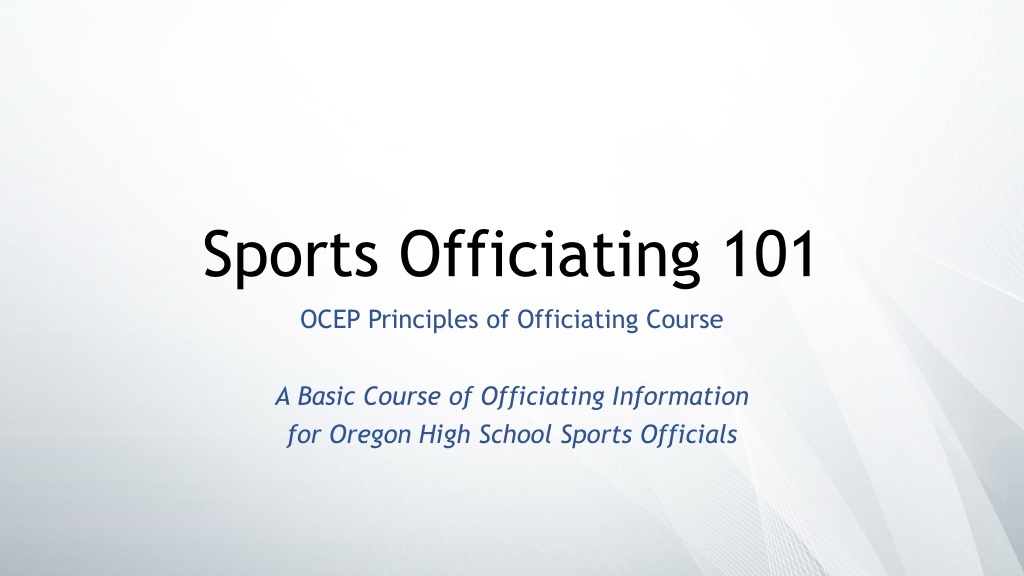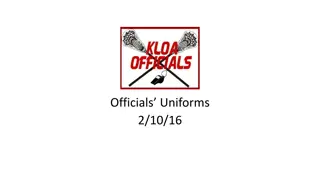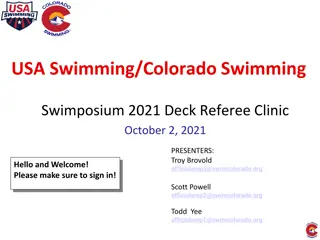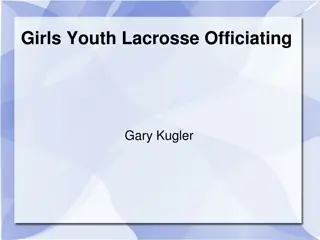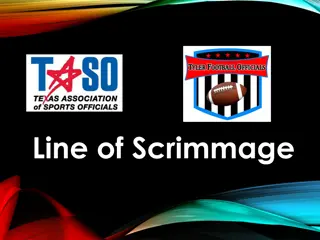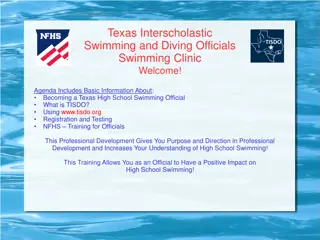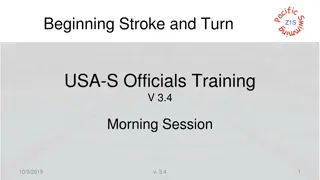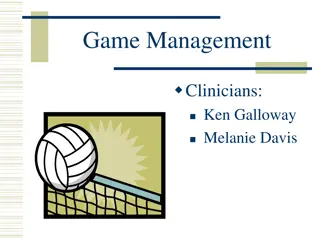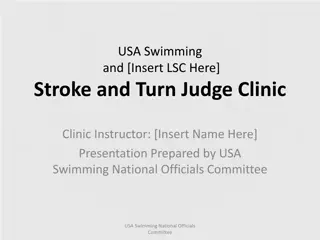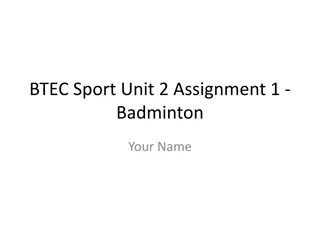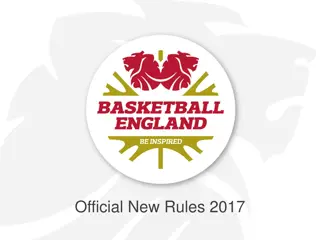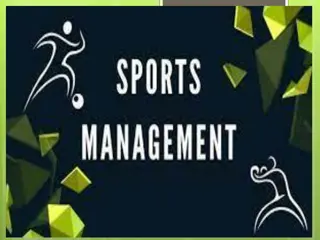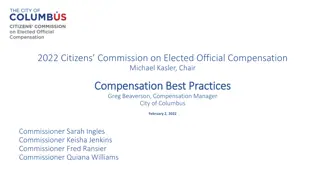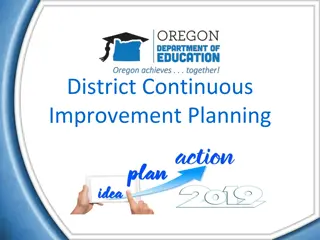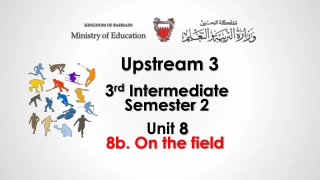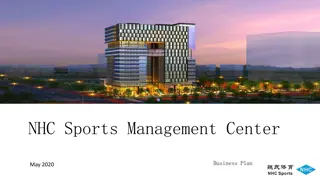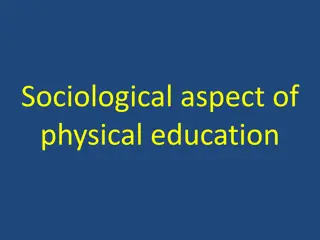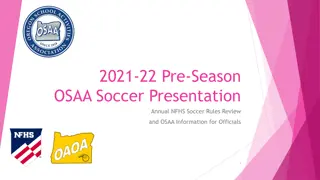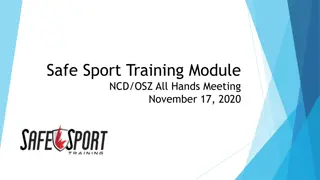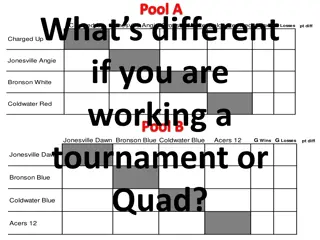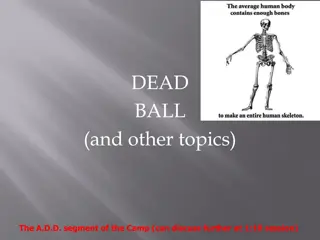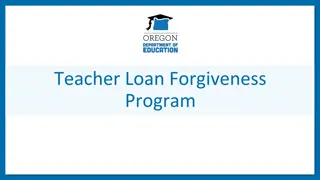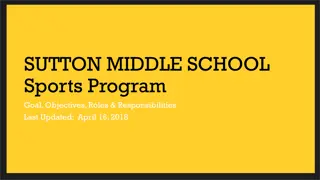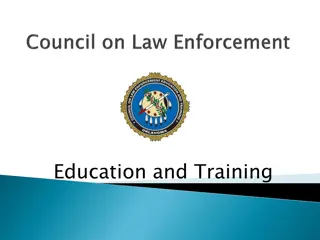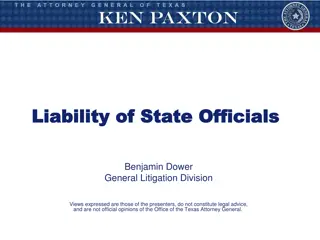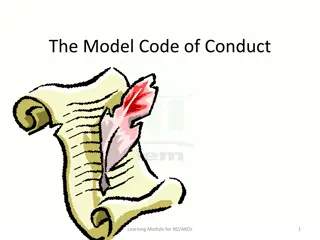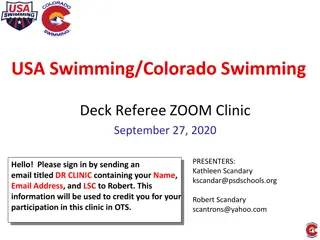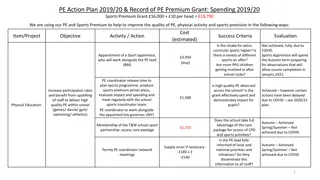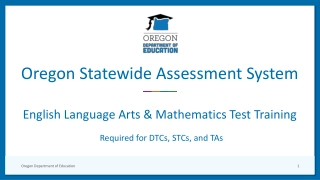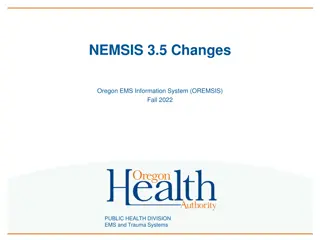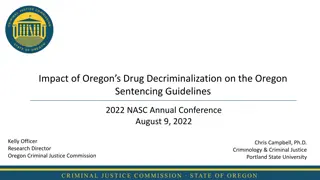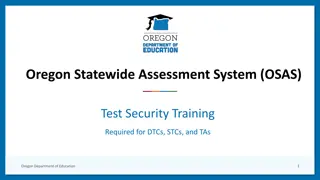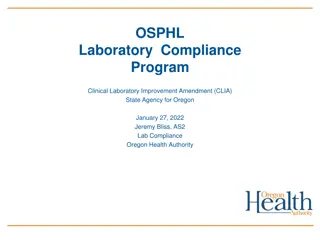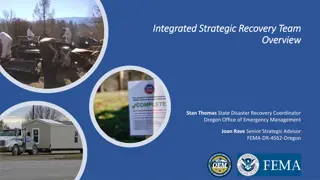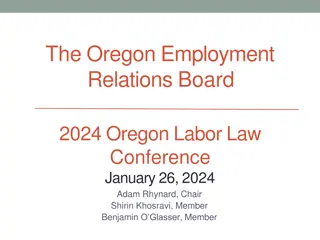Essentials of Officiating for Oregon High School Sports Officials
Dive into the foundational principles of sports officiating with the OCEP Principles of Officiating Course tailored for Oregon high school sports officials. Explore topics ranging from roles and responsibilities to conflict management and fitness, essential for successful officiating. Understand the structure of OSAA and the importance of joining your local officials association for a fulfilling officiating experience.
Download Presentation

Please find below an Image/Link to download the presentation.
The content on the website is provided AS IS for your information and personal use only. It may not be sold, licensed, or shared on other websites without obtaining consent from the author. Download presentation by click this link. If you encounter any issues during the download, it is possible that the publisher has removed the file from their server.
E N D
Presentation Transcript
Sports Officiating 101 OCEP Principles of Officiating Course A Basic Course of Officiating Information for Oregon High School Sports Officials
Topics Introduction Local Officials Association Legal and Business Issues Roles, Responsibilities, and Ethics Goal Setting Officiating Styles Communication Skills Building Confidence Concentration and Anxiety Making Decisions Managing Conflict Fitness for Officials Looking Ahead
Introduction Welcome
Participant Introductions Who are you? How much officiating experience do you have? Why did you want to become an official? Prolong Athletic Involvement Personal Reasons Provide an Enjoyable Physical Activity Extra Money Part-time Career
Local Officials Association Lesson 1
OSAA Governing Structure 291 Member High Schools OSAA Delegate Assembly OSAA Executive Board
OSAA Executive Director & Staff OADA OACA OAOA Local Officials Association
Your Local Officials Association Join a local officials association: www.osaa.org/officials Governed by your association s Executive Board as described in your association s constitution and by-laws Commissioner of Officials assigns games Don t lobby or beg for games do not trade assignments Do not solicit games from coaches or Athletic Directors (ADs) Attend regular meetings
Your Local Officials Association Most associations are incorporated as non-profit corporations for educational purposes OAOA dues provide director s and officer s insurance coverage Associations may charge membership dues or fees: Some association collect dues at the start of the season Others may automatically deduct dues and fees from payments
Utilizing Your Association Communicate especially with your Commissioner Find a mentor or develop a support network Car-pool to assignments with crew Hang around officials, watch games, arrive early, stay later Post-game get-togethers Training opportunities: camps, clinics, films, publications Ask for observations; get feedback Connect with national associations, NASO, frequent officiating websites
Questions to Ask What is the process for advancement in your local officials association? If you feel that you re being treated unfairly, how do you voice your concerns and to whom?
Legal and Business Items Lesson 2
OSAA Certification Requirements To be an OSAA certified official, an individual must: Be at least 18 years of age Be a member in good standing of a local officials association Complete the annual OSAA online officials registration process Take the NFHS rules exam Attend six study/training meetings or complete 10 hours of training Pass an annual criminal history conviction screening Complete an annual OSAA concussion awareness training course The full list of certification requirements can be found in the OSAA Athletic Officials Handbook, Rule 4
Criminal Conviction History Screening Per OSAA rule to be certified, officials cannot have been convicted of: A felony involving the use, possession or sale of a controlled substance within the last 10 years*; or A crime involving the use or threatened use of violence against a person within the last 10 years*; or A crime involving a minor child at any time. *The 10-year period of ineligibility to officiate shall commence from the date of suspension from officiating duties or from the date of conviction whichever occurred first
Concussion Training Requirement In the state of Oregon, the law requires youth sports officials to receive annual training on concussions The OSAA requires an online course to be completed (which meets this requirement) before an official is allowed to be assigned to any contest The OSAA online course, Understanding Concussions What Officials Need to Know , is oriented towards officials and is the only acceptable training recognized for OSAA officials Concussion training must be completed every year
OCEP Principles The OSAA/OAOA Officials Certification and Education Program, or OCEP, is designed to ensure that Oregon officials statewide are trained in a consistent and standardized manner There are two components: OCEP Principles certification and sport specific OCEP Playoff certification Officials must obtain OCEP Principles certification within the first three years of officiating This course presentation fulfills this requirement Officials certified by the OSAA in 2005-06, or prior; or any transfer official from another state are exempt
OCEP Playoff As part of OCEP, officials selected to officiate any OSAA State Championship event must have obtained and be currently certified in their sport specific OCEP Playoff certification To obtain, officials shall attend an OCEP Playoff Certification Clinic, soccer officials obtain OCEP Playoff certification by completing the USSF Grade 8 Referee Course To maintain, and have current OCEP Playoff certification: Football, Volleyball, Basketball, Baseball, and Softball officials must recertify every five years in the same manner as obtaining OCEP Playoff certification Wrestling officials must recertify every three years in the same manner as obtaining OCEP Playoff Certification Soccer officials must recertify every five years by attending one of the following: ORC Referee Committee Regional Referee/Intermediate Training Clinic, ORC Big Training Weekend, or an SRI approved training session
Levels of Certification OSAA Background Check Concussion Training OCEP Principles OCEP Playoff Level Exam Registration Registered Cannot officiate any OSAA sanctioned contest Sub-Varsity < 75% Can officiate OSAA sanctioned contests below the varsity level Varsity 75% Can officiate varsity and sub-varsity OSAA sanctioned contests Playoff 90% Can officiate any level of OSAA sanctioned contest and OSAA State Championship events
Independent Contractors OSAA officials are Independent Contractors, not employees No withholding of state or federal taxes from earnings Independent contractors receive a Form 1099 at the end of the year Solely responsible for reporting and paying taxes, including state and federal income taxes, self-employment taxes, etc. Some officiating expenses can be deducted Consult a tax professional Not subject to wage/hour laws (min. wage, overtime, rest periods) Not covered by worker s compensation insurance Cannot use the wages they earn to qualify for unemployment insurance benefits when they are unemployed No employment benefits, such as health insurance and pension plans
Important Liability Concerns Incidents with player injuries Allow medical personnel to attend to the player Game played according to the rules Manage the game, control rough play, penalize unsporting conduct Player equipment What is allowed and what isn t; do not compromise participant safety Playing surface inspection Safety is the number one priority
Officials Legal Concerns Officials need to have good medical and personal liability insurance, or as required by state law Secondary coverage is available through the NFHS Additionally through the National Association of Sports Officials (NASO)
Other Administrative Items The OSAA and the NFHS do not recognize protests In the justice courts, game calls cannot be challenged or outcomes changed without demonstrable corruption (bribery) Disagreement over calls is part of the game, it s part of our human nature Officials should support one another, even if opinions differ Judgement calls can be readily defended by governing bodies and commissioners However, the misapplication of rules is inexcusable
Physical Contact with Officials Under Oregon law, it s a criminal offense to assault a sports official However rare, be prepared with recommended procedures: Don t physically strike back get to somewhere safe Identify the attacker, if possible even if just a description Obtain names and contact information of witnesses Write down what happened and how you were injured Get appropriate medical attention, if necessary Determine if video of the game/incident is available Contact your Commissioner immediately Consult legal counsel
Roles, Responsibilities, & Ethics Lesson 3
Roles What are the roles of the official? Keep the Game Safe, Fair, and Fun
Responsibilities Ensuring Player Safety Coach must assert players are legally and properly equipped Officials must inspect and enforce proper player equipment for rule compliance and for safety of all participants Inspecting Facilities Plan to set aside time for field/court/facility safety Identify and correct safety hazards utilizing game-site administrators The earlier recognized, the better
Responsibilities Regulating Game Conduct It is up to the official to know the rules of the game Enforcement of infractions/violations falls to the official Officials must learn when to use warnings, when to penalize, when to ignore, and when to be firm Player safety and unsportsmanlike behavior are important aspects that need to be addressed what you allow, you promote Injury Response When in doubt, act on the side of caution in regards to player safety
Responsibilities Response to Crowd Situations If necessary, alert game management Do not engage with spectators directly Encouragement of Fair Play Fundamental role of an official is to see the contest is played in a safe, fair, and fun manner Know the allowable considerations for rule enforcement Avoiding outside influences and ignoring irrelevant factors will help officials operate consistently throughout the entire contest
Responsibilities Promotion of Good Sportsmanship Officials can influence player behavior through game management and rule enforcement There are many tools at the disposal of officials Acknowledge acts of good sportsmanship Penalize unsporting conduct
Ethics Master Knowledge of Rules and Mechanics Officials shall master both the rules of the game and the mechanics necessary to enforce the rules and should exercise authority in an impartial, firm and controlled manner Officials need to know what they are doing when they step onto the field, court, or floor We need to know the rules and where to stand to make the best calls Officials must be decisive, and not inconsistent, and always in control of their emotions
Ethics Work Constructively and Cooperatively Officials shall work with each other and their state associations in a constructive and cooperative manner Officials need to get along with and respect the people in their local association, their officiating partners, and the folks at the state office Everybody needs to work together to make things better There is no justification to bad mouth anybody Getting along makes your officiating experience more rewarding and enjoyable
Ethics Uphold Honor and Dignity of the Profession Officiating is no longer a casual hobby, treat is as a profession Officials have a vast amount of final power and need to behave in a professional manner at all times Be a responsible and professional steward of the game Prepare Mentally and Physically Dress neatly and carry yourselves in a manner consistent with the high standards of the profession Officiating is a physical activity, be in good shape Focus on the job at hand and leave other problems behind for a few hours Look good; the uniform and how it s worn says a lot about your commitment
Ethics Respect and Fulfill Contractual Obligations Communicate your availability and be mindful of your commitments Professionalism includes being accountable to your obligations It s a cardinal sin to be late to a game; plan ahead Leave plenty of time for heavy traffic, travel, weather, etc. If you accept a game assignment, be there Contact your assigner or one of your partners if problems arise Don t turn back one assignment for a better offer; this is unethical behavior that will not be tolerated
Ethics Your Conduct Influences Respect of Others Remember you only get one chance at a first impression Your actions may be perceived as representative of your officials association or toward the profession itself Do not do anything that diminishes the respect people have for officials - don t say or do anything unwise or compromising Do not draw attention to yourself, be professional, the game is not about you, it s about the players Sometimes that s hard for an official to accept, because it s human nature to want to be recognized for the job you do
Conflict of Interest Sports officials must be alert to potential conflicts of interest In the perfect world, officials would be strangers to coaches and schools, but in the real world, that s not going to happen It s the perception of bias and favoritism that makes things difficult when officials do not recognize potential conflicts of interest Officials are ethically bound to report any conflict of interest, no matter how remote, to their assignor Assignors appreciate knowing this in advance prior to making a schedule, but should a conflict of interest develop as the season progresses, officials must request a change in assignment
Minimum Conflict of Interest Policies Unless the ADs and the assigning Commissioner agree, no official shall be assigned to a varsity contest if: The contest involves a school currently attended by the official s child or step-child The contest involves a school at which the official or a member of his/her immediate family is a current employee or coach An immediate family member of the official is a team member of one of the involved teams The contest involves a school from which the official has graduated within the last four years There are other factors or relationships between the official and a participating school that, in the judgment of the commissioner or the official, might give rise to the appearance of a conflict of interest
Goal Setting Lesson 4
Set Goals In order to be successful at anything, you must have some goals Setting goals helps to motivate and improve performance; if you set an important goal for yourself, you will generally work hard to achieve that goal Without goals, many people just drift through life, some bump into success along the way, others don t Goals help focus on what is important Setting goals is setting standards for what you d like to do
Potential Problems with Setting Goals Not measurable Conflict with other goals No ownership Setting too many goals Obstructed by fear of trying something new or fear of failure Setting goals to please someone else; lacking investment Unrealistic expectations
Goal Setting Suggestions Consider your needs as the highest priority Identify what you want to get out of officiating What are your strengths? Do you want to further improve? What are your weaknesses? What do you want to change? What do you enjoy the most out of officiating? How can you advance? Are there previous evaluations or feedback to reflect on?
Setting Successful Goals Establish short term and long team goals Make goals specific State goals in positive terms Set goals that are obtainable Set goals that are measurable Have a feedback mechanism in place Know what is necessary to achieve your goal Be flexible and change or adapt as necessary, learn from speedbumps Enjoy meeting your goals
My Goals Take a minute or two and identify one goal you can accomplish this season.
Officiating Styles Lesson 5
By the Book Approach I Am the Law Master of the rules, inside and out Events are very black and white with prescribed reactions Pros? Cons?
Little Involvement Less is More Let players play with as little interference as possible Avoid conflict, let game flow Pros? Cons?
The Middle Ground Use common sense Implement preventive officiating and know what that means Be well versed in the rules of the game, but also know the spirit of the game and the correct intent of the rules Know what to call and when to call it Know when the best call may be a no-call
Context of a Contest The context of a game may determine which officiating style works best Big cross town rivalry Bad blood between opponents Skill level of the players Some of these may be known before the game starts Be mindful of your preconceptions coming into a contest, do not let your personal preferences or notions impose itself on a contest unduly
Good Officials Know the rules and spirit of the game Know and use correct vocabulary Know mechanics for positioning and signaling Communicate effectively Make calls with confidence Are able to focus on the game Remain invisible don t draw attention Keep in control stay poised Stay in shape and hustle
Traits of Top Officials Average Officials Reactive Foul Management Calls Fouls Sees Advantage Avoids Pressure Penalizes Top Officials Proactive Game Management Sorts Fouls Feels / Anticipate Handles Pressure Communicates
